CONTENTS
Guide
TO MONEY
For the wonderful things you do for us, the terrible things
you do to us, and all the gray matter in between
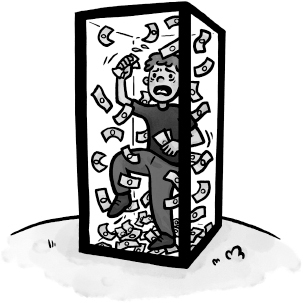
I n 1975, Bob Eubanks hosted a short-lived TV game show called The Diamond Head Game. Taped in Hawaii, it featured a unique bonus round called The Money Volcano. Contestants were put in a glass box that quickly transformed into a furious wind tunnel of flying money. Bills whirled, spun, and flapped all around as the players scrambled to grab as much as they possibly could before time ran out. They went absolutely bonkers inside the Money Volcano, reaching, clutching, spinning, flailing about inside a tornado of cash. It was great entertainment: For fifteen seconds it was clear that nothing in the world was more important than money.
To a certain extent, we are all inside the Money Volcano. We are playing the game in a less intense and visible manner, but we have been playing, and being played, for many years, in countless ways. Most of us think about money a lot of the time: how much we have, how much we need, how to get more, how to keep what we have, and how much our neighbors, friends, and colleagues make, spend, and save. Luxuries, bills, opportunities, freedom, stress: Money touches every part of modern life, from family budgets to national politics, from shopping lists to savings accounts.
And theres more to think about every day, as the financial world becomes more advanced; as we get more complex mortgages, loans, and insurance; and as we live longer into retirement and face new financial technologies, more complex financial options, and greater financial challenges.
Thinking a lot about money would be fine if by thinking more about it we were able to make better decisions. But thats not the case. The truth is, making bad money decisions is a hallmark of humanity. Were fantastic at messing up our financial lives. Congratulations, humans. Were the best.
Consider these questions:
 Does it matter if we use credit cards or cash? We spend the same amount either way, right? Actually, studies show we are more willing to pay more when we use a credit card. We make bigger purchases and leave larger tips with credit cards. Were also more likely to underestimate or forget how much we spend whenyou guessed itusing the payment method we use most: a credit card.
Does it matter if we use credit cards or cash? We spend the same amount either way, right? Actually, studies show we are more willing to pay more when we use a credit card. We make bigger purchases and leave larger tips with credit cards. Were also more likely to underestimate or forget how much we spend whenyou guessed itusing the payment method we use most: a credit card.
 Whats a better deal, a locksmith who opens a door in two minutes and charges $100 or one who takes an hour and charges the same $100? Most people think the one who took longer is the better deal, because he put in more effort and he cost less per hour. But what if the locksmith who took longer had to try several times and broke a bunch of tools before he succeeded? And charged $120? Surprisingly, most people still think this locksmith is a better value than the speedy one, even though all he did was waste an hour of our time with his incompetence.
Whats a better deal, a locksmith who opens a door in two minutes and charges $100 or one who takes an hour and charges the same $100? Most people think the one who took longer is the better deal, because he put in more effort and he cost less per hour. But what if the locksmith who took longer had to try several times and broke a bunch of tools before he succeeded? And charged $120? Surprisingly, most people still think this locksmith is a better value than the speedy one, even though all he did was waste an hour of our time with his incompetence.
 Are we saving enough for retirement? Do we all know even vaguely when well stop working, how much well have earned and saved by then, how our investments will have grown and what our expenses will be for the exact number of years well live after that? No? Were so intimidated by retirement planning that, as a society, were saving less than 10 percent of what we need, arent confident we are saving enough, and believe well have to work until were eighty even though our life expectancy is seventy-eight. Well, thats one way to cut down on retirement expenses: Never retire.
Are we saving enough for retirement? Do we all know even vaguely when well stop working, how much well have earned and saved by then, how our investments will have grown and what our expenses will be for the exact number of years well live after that? No? Were so intimidated by retirement planning that, as a society, were saving less than 10 percent of what we need, arent confident we are saving enough, and believe well have to work until were eighty even though our life expectancy is seventy-eight. Well, thats one way to cut down on retirement expenses: Never retire.
 Do we spend our time wisely? Or do we spend more time driving around looking for a gas station that will save us a few cents than we spend trying to find a cheaper mortgage?
Do we spend our time wisely? Or do we spend more time driving around looking for a gas station that will save us a few cents than we spend trying to find a cheaper mortgage?
Not only does thinking about money not improve financial decision-making, but sometimes the simple act of thinking about money actually changes us in deep and troublesome ways. Thinking about money literally messes with our heads.
Given the importance of moneyfor our own lives, for the economy, and for societyand given the challenges we have thinking about money in rational ways, what can we do to sharpen the way we think? The standard answer to this question is usually financial education or the more sophisticated term, financial literacy. Unfortunately, financial literacy lessons, like how to buy a car or get a mortgage, tend to fade quickly, with almost zero long-term impact on our actions.
So, this book is not going to financially literate us or tell us what to do with our money every time we open our wallets. Instead, well explore some of the most common mistakes we make when it comes to money, and, more important, why we make these mistakes. Then, when we face our next financial decision, we might be better able to understand the forces at play and, hopefully, make better choices. Or at least more informed ones.
Were going to introduce a bunch of people and share their money stories. Well show what they did in certain financial situations. Then well explain what science tells us about their experiences. Some of these stories are real, while some are, like the movies, based upon a true story. Some of the people are reasonable. Some are fools. They might seem to fit certain stereotypes because well emphasize, even exaggerate, some of their characteristics in order to highlight certain common behaviors. We hope everyone recognizes the humanity, the mistakes, and the promise in each of their stories and how they echo in our own lives.
This book reveals how we think about money and the mistakes we make when we do. Its about the gaps between our conscious understanding of how money works, the way we actually use money, and how we should rationally think about and use money. Its about the challenges we all have reasoning about money, and the common mistakes we make spending it.
Will we be able to spend our money more wisely after reading this book? For sure. Maybe. A little bit. Probably.
At a minimum, we believe that revealing the complex forces behind the money choices that consume our time and control our lives can improve our financial affairs. We also believe that by understanding moneys impact on our thinking, we will be able to make better nonfinancial decisions. Why? Because our decisions about money are about more than just money. The same forces that shape our reality in the domain of money also influence how we value the important things in the rest of our lives: how we spend our time, manage our career, embrace other people, develop relationships, make ourselves happy, and, ultimately, how we understand the world around us.
Put more simply, this book is going to make everything better. Isnt that worth the cover price?
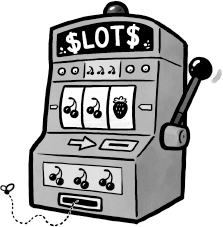
G eorge Jones needs to blow off some steam. Work is stressful, the kids are fighting, and money is tight. So on a company trip to Las Vegas he heads to a casino. He parks, for free, in the lot at the end of a remarkably well-kept, publicly financed road and wanders aimlessly, head down, into the alternate universe of the casino.
The sound wakes him from his stupor: eighties music and cash registers mixed with clinking coins and the dinging of a thousand slot machines. He wonders how long hes been at the casino. There are no clocks, but judging by the old people slumped at the slot machines, it might have been a lifetime. It was probably five minutes. He couldnt be far from the entrance. But, then again, he cant see the entrance... or the exit... or any doors or windows or hallways or means of escape whatsoever. Just flashing lights, scantily clad cocktail servers, dollar signs, and people who are either ecstatic or miserable... but never anything in between.
Next page
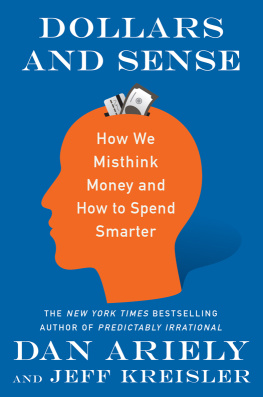
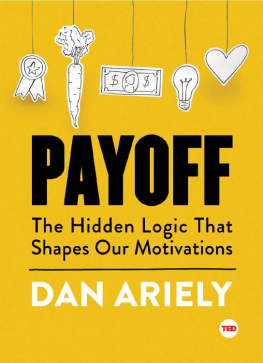

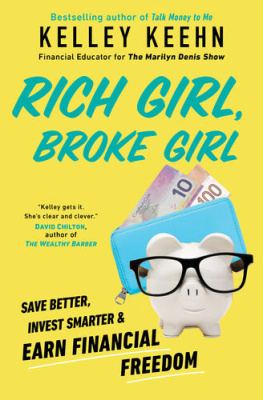

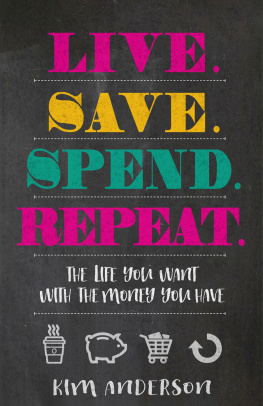
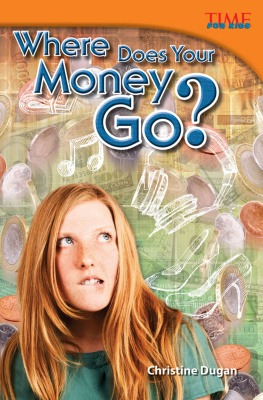
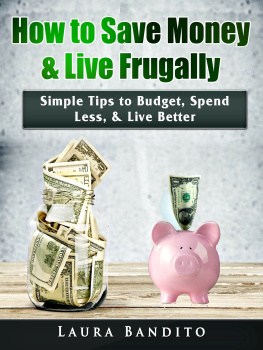
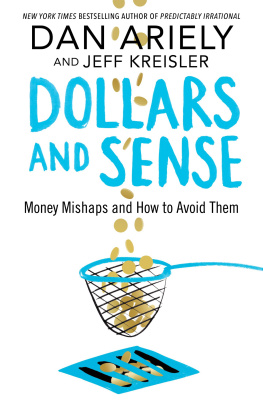
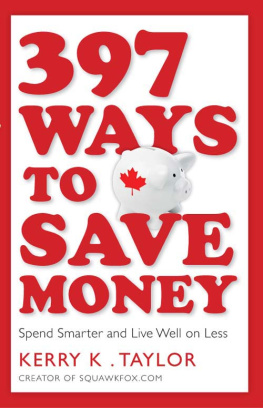
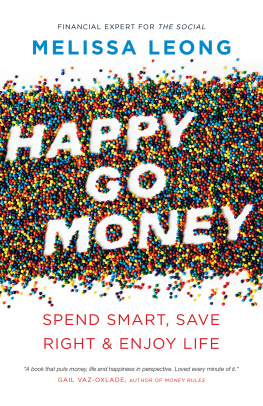
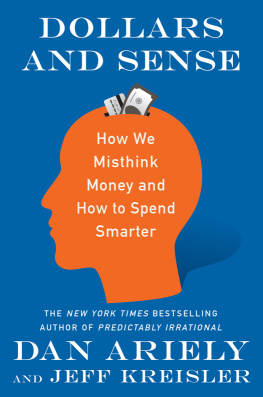
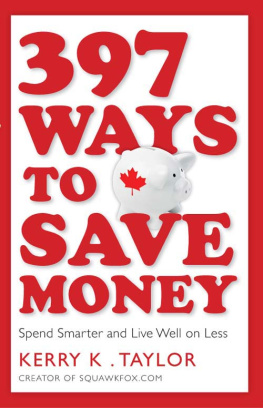

 Does it matter if we use credit cards or cash? We spend the same amount either way, right? Actually, studies show we are more willing to pay more when we use a credit card. We make bigger purchases and leave larger tips with credit cards. Were also more likely to underestimate or forget how much we spend whenyou guessed itusing the payment method we use most: a credit card.
Does it matter if we use credit cards or cash? We spend the same amount either way, right? Actually, studies show we are more willing to pay more when we use a credit card. We make bigger purchases and leave larger tips with credit cards. Were also more likely to underestimate or forget how much we spend whenyou guessed itusing the payment method we use most: a credit card.